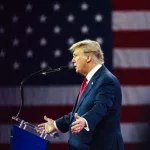
On Monday, July 1, the Supreme Court deemed that Donald Trump is partially immune from his 2020 election subversion charges. The Court said “official” acts taken by a president are protected, but not steps he took as a candidate.
In a 6-3 ruling along ideological lines, the court ruled that Trump can be tried for any of his efforts to overturn his 2020 loss that were not taken in his official capacity. They ruled against Trump’s claim that he enjoys immunity from prosecution as a whole, but said that he is absolutely immune from being charged for “official” presidential acts.
Chief Justice John Roberts wrote for the 6-3 majority: “The parties before us do not dispute that a former President can be subject to criminal prosecution for unofficial acts committed while in office. They also agree that some of the conduct described in the indictment includes actions taken by Trump in his unofficial capacity.”.
The majority asserted that there should be a clearer distinction between official presidential acts and private acts that happen to be done by a president, with the court’s syllabus reading: “The President enjoys no immunity for his unofficial acts, and not everything the President does is official. The President is not above the law. But under our system of separated powers, the President may not be prosecuted for exercising his core constitutional powers, and he is entitled to at least presumptive immunity from prosecution for his official acts.”. The decision brings the case back down to a lower court, which must now figure out whether any of the allegations in the Jan. 6 case fall under the category of “unofficial” acts, and whether a fair Jan. 6 trial could move forward with the Supreme Court’s ideology in mind.
On Truth Social, Trump called the decision a “BIG WIN FOR OUR CONSTITUTION AND DEMOCRACY.”
Editorial credit: Jonah Elkowitz / Shutterstock.com



